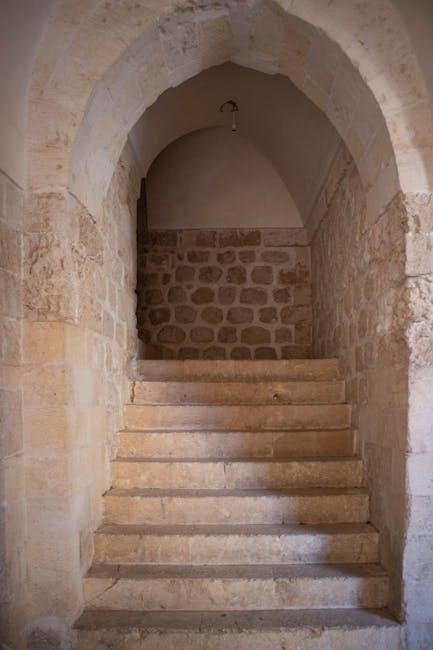Umrah, often called the minor pilgrimage, is a sacred Islamic ritual performed in Mecca. It involves key steps like Ihram, Tawaf, Sai, and Halq, offering spiritual renewal and closeness to Allah.
1.1 Definition and Significance of Umrah
Umrah, often referred to as the minor pilgrimage, is a sacred Islamic ritual performed in Mecca. It is a Sunnah act, meaning it is highly recommended but not obligatory like Hajj. The significance of Umrah lies in its spiritual purification and its role in seeking divine forgiveness and blessings. Unlike Hajj, Umrah can be performed at any time of the year, except during the five days of Hajj, when it is considered Makruh (disliked). Umrah involves four main rituals: Ihram, Tawaf, Sai, and Halq or Taqsir. Muslims undertake Umrah to strengthen their faith, reflect on their relationship with Allah, and seek spiritual renewal. It is a powerful expression of devotion and unity among Muslims worldwide, embodying the principles of humility, gratitude, and submission to Allah’s will.

1.2 Types of Umrah
Umrah is categorized into two main types: Umrah Mufrada and Umrah Tamattu. Umrah Mufrada is performed independently and can be done at any time of the year. It involves the same rituals as Umrah but is not tied to the Hajj season. On the other hand, Umrah Tamattu is performed in conjunction with Hajj during the Hajj season. This type is specifically for those intending to perform Hajj, allowing pilgrims to combine both rites seamlessly. Both types share the same fundamental rituals—Ihram, Tawaf, Sai, and Halq or Taqsir—but differ in their timing and purpose. Understanding these distinctions is crucial for pilgrims to ensure they perform the rites correctly and in accordance with Islamic guidelines. This classification highlights the flexibility and significance of Umrah as a spiritual practice.

1.3 Importance of Umrah in Islam
Umrah holds a profound significance in Islam, serving as a means of spiritual purification and a demonstration of devotion to Allah. It is considered a Sunnah, following the footsteps of the Prophet Muhammad (peace be upon him), who emphasized its rewards and benefits. Performing Umrah is a way to seek forgiveness, strengthen faith, and attain inner peace. It also fosters a sense of unity among Muslims worldwide, as pilgrims from diverse backgrounds gather in Mecca to perform the same rituals. Additionally, Umrah is a form of worship that can be undertaken at any time, allowing believers to reconnect with their spirituality outside the obligatory Hajj pilgrimage. Its importance is further highlighted by the Prophet’s teachings, which encourage Muslims to perform Umrah as a means of drawing closer to Allah and seeking His mercy. Thus, Umrah is a cherished act of worship in Islam, offering both spiritual and communal enrichment.
Preparation for Umrah
Preparation for Umrah involves spiritual, physical, and financial readiness. Pilgrims must ensure they meet all requirements, including proper documentation, health precautions, and mental preparation for the sacred rituals ahead.
2.1 Spiritual Preparation
Spiritual preparation is crucial for Umrah, involving sincere intentions, repentance, and a strong connection with Allah. Pilgrims should engage in regular prayer, recite the Quran, and seek forgiveness to purify their hearts. They must also study the rituals of Umrah to understand their significance and perform them with devotion. Additionally, reflecting on the life of Prophet Muhammad (peace be upon him) and his teachings can deepen the spiritual experience. It is essential to approach Umrah with humility and gratitude, recognizing it as a privilege to worship in the holy city of Mecca. By focusing on spiritual growth, pilgrims can ensure their Umrah is a meaningful and transformative journey. Proper mental and emotional readiness helps in fully immersing oneself in the sacred rituals, seeking Allah’s mercy and blessings. This preparation lays the foundation for a fulfilling and enriching Umrah experience.
2.2 Physical Preparation
Physical preparation is essential for a successful Umrah experience, ensuring pilgrims can endure the demands of the rituals. It begins with maintaining good health and consulting a doctor if necessary. Pilgrims should also ensure they are vaccinated against any required diseases. Building physical stamina through light exercise is recommended, as Umrah involves extensive walking and standing. Proper grooming is part of the preparation, including trimming nails and removing unwanted hair. Wearing comfortable, modest clothing and footwear is crucial for the journey and rituals. Additionally, staying hydrated and managing energy levels are vital, especially in Mecca’s climate. Pilgrims should also prepare for the physical aspects of Ihram, such as wearing simple garments and avoiding certain practices. By prioritizing physical well-being, pilgrims can focus on the spiritual aspects of Umrah without unnecessary discomfort. This preparation ensures they are ready to perform the rituals with ease and devotion.
2.3 Financial Preparation
Financial preparation is a critical aspect of planning for Umrah, ensuring a smooth and stress-free experience. Pilgrims should budget for all expenses, including flights, accommodation, food, and transportation. Saving in advance is essential to cover these costs without financial strain. Additionally, allocating funds for visa fees, mandatory vaccinations, and travel insurance is important. It is advisable to research affordable packages or plan independently to manage expenses effectively. Pilgrims should also avoid unnecessary spending and prioritize budget-friendly options. Carrying local currency (Saudi Riyals) for incidentals and having an emergency fund are recommended. Proper financial planning ensures that the focus remains on the spiritual aspects of Umrah rather than financial worries. By managing resources wisely, pilgrims can fulfill their rituals with peace of mind and gratitude. This preparation reflects the Islamic value of moderation and responsible stewardship of resources.

Step-by-Step Guide to Umrah Performance
This guide outlines the essential rituals of Umrah, including Ihram, Tawaf, Sai, and Halq/Taqsir, providing a clear roadmap for pilgrims to fulfill the sacred journey with devotion and adherence to Islamic traditions.
3.1 Ihram: The State of Consecration
Ihram is the first step in performing Umrah, symbolizing a state of consecration and spiritual purification. Pilgrims enter Ihram at designated Meeqat points, where they don simple, unseamed garments known as Ihram clothing. Men wear a white, two-piece shroud, while women continue in their modest attire. Before donning Ihram, one must perform Ghusl (ritual bath) and Wudhu (ablution), ensuring physical and spiritual cleanliness. The intention, or Niyyah, to perform Umrah must be made, followed by the recitation of the Talbiyah, a prayer expressing obedience to Allah. During Ihram, pilgrims must avoid certain actions, such as trimming nails, shaving, or engaging in marital relations, to maintain the sanctity of their state. This rituals prepares the pilgrim for the sacred journey ahead, fostering a mindset of humility and devotion. Properly observing Ihram is essential to the validity of the Umrah.
3.2 Tawaf: Circumambulating the Kaaba
Tawaf is a central ritual of Umrah, involving the circumambulation of the Kaaba seven times in an anticlockwise direction. Pilgrims begin at the Black Stone, where they kiss or touch it as a sign of reverence. Each circuit is performed with dignity, reciting prayers or verses from the Quran. Men are encouraged to perform the first three circuits with al-idhtiba, exposing their right shoulder, while women maintain their modest attire. Supplications during Tawaf are considered highly rewarded, emphasizing gratitude, forgiveness, and divine guidance. After completing seven circuits, pilgrims often drink from the Zamzam well and perform two Rakahs of prayer behind the Maqam Ibrahim. Tawaf symbolizes unity, equality, and devotion, reminding pilgrims of their connection to the sacred House of Allah. Proper etiquette, such as avoiding distractions and maintaining focus, is essential to uphold the sanctity of this act. Tawaf is a profound expression of faith and submission to Allah.
3.3 Sai: Running Between Safa and Marwah
Sai is the ritual of traversing between the hills of Safa and Marwah seven times, a pivotal step in Umrah. This act commemorates Hagar’s search for water for her son Ishmael, symbolizing perseverance and divine providence. Pilgrims begin at Safa, facing the Kaaba, and recite prayers before proceeding. The first three circuits are done at a brisk pace for men, while women walk normally. The remaining four circuits are performed at a normal walking pace for everyone. Supplications and remembrance of Allah are encouraged throughout. Upon reaching Marwah for the seventh time, the ritual is complete. Sai reflects trust in Allah’s plan and emulates the resilience of Hagar. It is essential to maintain modesty, avoid distractions, and focus on the spiritual significance of this act, which strengthens one’s faith and patience.

3.4 Halq or Taqsir: Completing the Ritual
Halq or Taqsir marks the final step of Umrah, where pilgrims shave or trim their hair, symbolizing the end of the sacred ritual. Men are required to shave their entire head, while women trim a small portion of their hair, typically from the ends. This act signifies liberation from the restrictions of Ihram and the completion of Umrah. It is recommended to perform Halq or Taqsir after completing Sai between Safa and Marwah. The act is a Sunnah and holds deep spiritual significance, representing humility and submission to Allah. Pilgrims are advised to perform this step with gratitude and reflection on the blessings of completing Umrah. After Halq or Taqsir, pilgrims are released from their sacred state and can resume their normal activities. This step is a beautiful conclusion to the Umrah journey, reinforcing the pilgrim’s connection with Allah.

Post-Umrah Responsibilities
After completing Umrah, pilgrims are encouraged to reflect on their spiritual journey and express gratitude. Sharing experiences and maintaining the blessings of Umrah through continued worship is highly recommended.
4.1 Tips for a Memorable Experience
To make your Umrah experience unforgettable, prioritize spiritual focus and sincerity. Arrive prepared with a step-by-step guide to ensure smooth rituals. Maintain cleanliness, both physically and mentally, to enhance your connection with Allah. Offer regular prayers and engage in heartfelt supplications, especially during Tawaf and Sai. Reflect on the significance of each ritual and its deep-rooted history in Islam. Capturing memories through photos can be meaningful, but avoid distractions to fully immerse in the experience. Seek guidance from reliable sources or experienced pilgrims to avoid common mistakes. Offer charity and engage in acts of kindness to amplify the spiritual benefits of your journey. Finally, remain patient and composed, especially during crowded times, to uphold the sanctity of the pilgrimage. By following these tips, you can ensure a profound and memorable Umrah experience.
4.2 Common Mistakes to Avoid
During Umrah, pilgrims often make mistakes that can detract from the purity of the experience. One common error is neglecting to enter the state of Ihram before reaching the Meeqat, which invalidates the ritual. Many also fail to complete the required circuits during Tawaf or Sai, unaware of the necessity of fulfilling all seven rounds. Some pilgrims forget to recite the Talbiyah promptly after donning Ihram, missing the opportunity to invoke Allah’s blessings. Additionally, rushing through the rituals without focus or failing to maintain cleanliness can diminish the spiritual impact. Ignorance of basic rules, such as not trimming nails or removing unwanted hair before Ihram, is another oversight. Pilgrims should also avoid distractions like excessive photography, which can divert attention from worship. Lastly, not seeking guidance from reliable sources often leads to errors in performing the rituals. Being mindful of these pitfalls ensures a more sincere and fulfilling Umrah experience.
Umrah is a profound spiritual journey that offers immense rewards and personal growth for Muslims. By following the step-by-step guide, pilgrims can ensure their rituals are performed correctly, maximizing the blessings and significance of this sacred act. It is essential to approach Umrah with sincere intention, proper preparation, and adherence to Islamic guidelines. Reflecting on the experience post-Umrah helps in maintaining a deeper connection with faith and applying the lessons learned in daily life. Remembering to avoid common mistakes enhances the purity of the ritual, while seeking knowledge from reliable sources guarantees a meaningful and enriching experience. Ultimately, Umrah is not just a physical journey but a spiritual renewal that strengthens one’s bond with Allah. Embracing this opportunity with mindfulness and devotion ensures a truly transformative experience.
